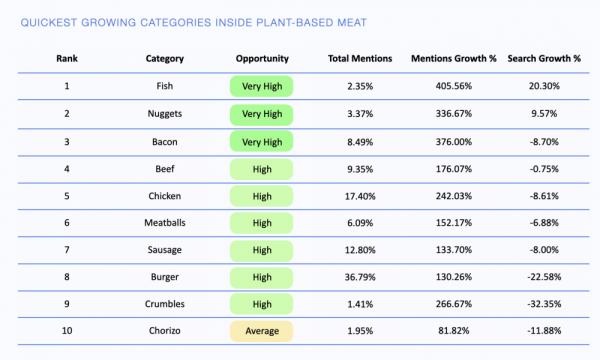Do plant-based search trends point to category slowdown? ‘The data is predictive of decreased trial’

Forecasts from Research & Markets suggests the plant-based food market is expected to grow at a CAGR of 11.9% from 2020 to 2027 to reach US$74.2 billion by 2027.
Expansion is being supported by rising consumer interest in health – and the health halo from which plant-based products benefit – as well as concerns over issues like animal welfare and the environmental impact of meat and dairy production.
The demand has created an influx of brands and innovation in the plant-based space. Vegan claims linked to new global food product launches doubled in 2020 compared to 2016, according to Mintel's Global New Product Database. A focus on flavour and other organoleptic qualities has extended the appeal of the sector beyond vegans and vegetarians to flexitarian consumers looking to cut their animal protein consumption.
However, according to Simporter’s AI consumer conversation tracking data, while consumer reviews and social media posts talking about plant-based meat analogues continue to see exponential growth, up over 100% and 80% respectively year-on-year, the amount of search activity around plant-based meats is showing a very different pattern. Searches actually declined over 10% in the period.
So what does this suggest about trends in the plant-based sector?
Simporter points to three possible ‘whys’ to explain what’s going on. And it might not all be good news for food makers who have been bullish about the runway for plant-based growth.
Search is predictive of trial
Firstly, Simporter stresses it is important to think about how people use search and other online communications. The number of searches people make relating to a product or service is predictive of trial.
The data shows plant-based meat hit its peak search activity in December 2019. Since this point, the number of searches made by consumers has settled down.
This isn’t in itself indicative of lower interest in plant-based products, Simporter CEO Dillon Hall told us… But it could be a warning sign.
“While the trail-off in plant-based searches could suggest that fewer new customers are coming into the category, the data may also just mean that consumer awareness of the category is growing - therefore, searches may be more pinpointed. But the most likely scenario is that the data is, indeed, predictive of decreased trial and the category will soon depend on recurring purchases.”
Simporter also noted that search is often predictive of longer-term demand. In this scenario, we are likely see a drop in user-generated content next year, the data provider suggested.
“When we dive into the data, we see around a six- to twelve-month delay between search spikes and user generated content spikes. As a result, we may see downward interest in plant-based meats in six- to twelve-months, following the downward search trend slope.”
Another factor explaining the disconnect between reviews, social media chatter, and searches could be that consumers simply aren’t eating plant-based meat analogues as much as they claim. However, talking about it is used as a symbol of status and a signal of what social ‘tribe’ consumers belong to.
“Plant-based meat, in many social circles, is cool. It is supposedly environmentally friendly, healthier, and expensive. There is a scenario where consumers are increasing their posts and reviews about plant-based meats to ‘chase clout’, when really they're consuming the products less often than they say they do.”
How to contend with slowing growth
Dillon believes that the data points to a normalisation of growth rates in a category that has been heavily hyped. “It is unlikely that plant-based meat will continue to grow as rapidly as it has the past few years. While it is certainly not a short-term fad, steep growth rates will certainly cool down before 2025,” he told us.
But not all products in the plant-based sector are witnessing the same deterioration in search interest. Nascent segments that are still relatively new to consumers – and where innovation levels are particularly high – continue to see rising search interest. Simporter revealed that plant-based fish top this list.
Consumer search interest in this segment over the past 12 months is more than 20% higher than the year prior despite the overall category's search interest decline. Consumers are mentioning it in reviews and social posts four times more often.
Behind fish, chicken nuggets are growing 337% in mentions and close to 10% in search interest, year-on-year. The data and analytics provider pointed to recent launches in the space from Impossible Foods and Beyond Meat, which it described as ‘spot on’.
Does this point to the possibility of innovating your way to growth? Could continued high levels of product launches in the space continue to bring new consumers in?
Dillon is sceptical.
“This is definitely a challenging question. While product launches certainly contribute to consumer chatter, those spikes are typically very short-term. So food makers can squeeze out some new trials by launching new products but, ultimately, if the demand isn't there, consumers won't be talking about the product or its segment for very long.”










